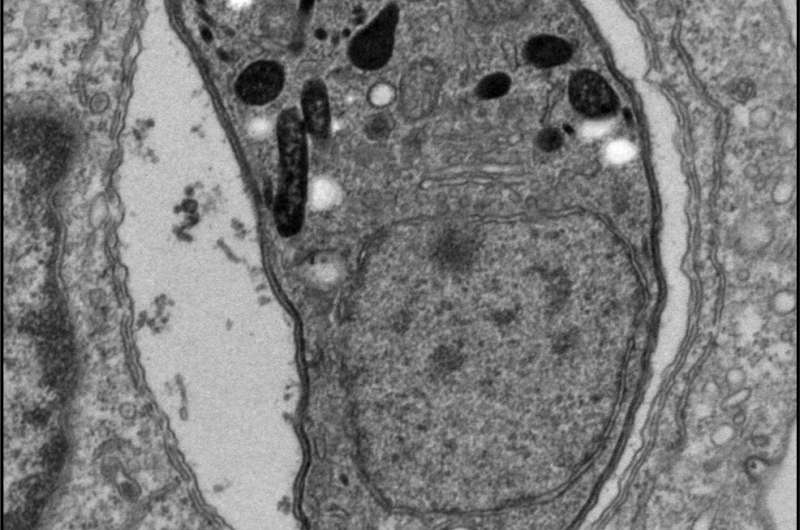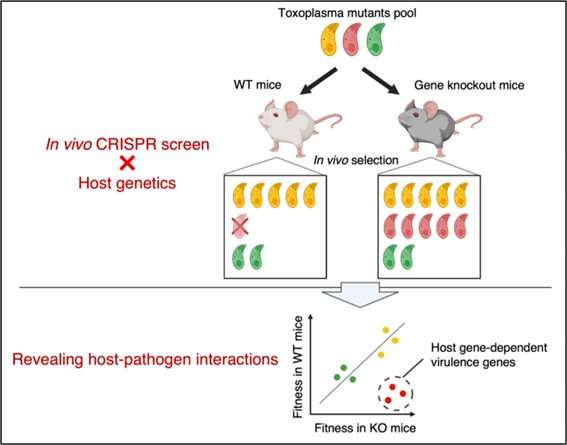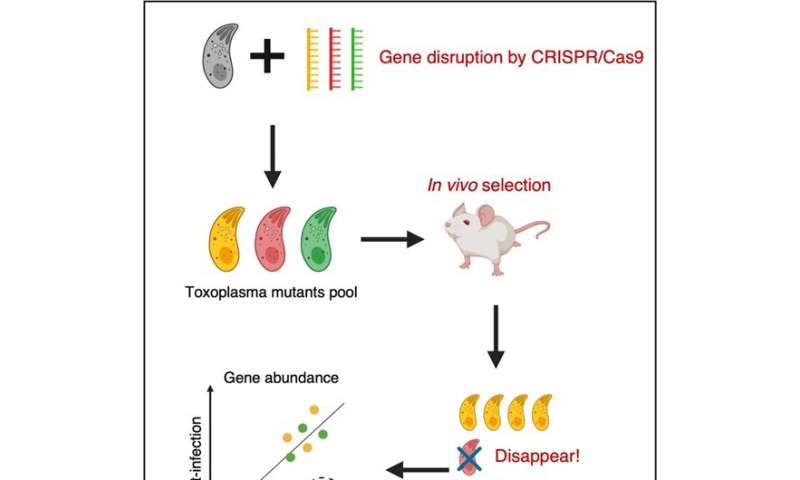This article has been reviewed according to Science X's editorial process and policies. Editors have highlighted the following attributes while ensuring the content's credibility:
fact-checked
peer-reviewed publication
trusted source
proofread
Novel genetic screen provides clues on how Toxoplasma behaves within a host

While the presence of harmful critters in your home may be addressed by a call to the exterminator, harmful parasites in the body can be much harder to expel. A single-celled parasite known as Toxoplasma gondii (hereafter Toxoplasma) commonly infects humans and other animals, and the resulting condition, known as toxoplasmosis, can cause severe health issues in people with weakened immune systems. Researchers in Japan have developed a tool to investigate how Toxoplasma promotes its survival within a host, shedding new light on potential strategies for the treatment and prevention of toxoplasmosis.
In a new study published in Cell Reports, researchers from Osaka University conducted a genetic screen using CRISPR technology in mice to confirm known genes and identify new genes involved in Toxoplasma fitness, i.e., the ability of the parasite to survive and thrive within a host. CRISPR genome editing is a method in which short fragments of genetic material known as guide RNAs (gRNAs) are utilized to modify specific sequences of DNA in the genome.
CRISPR screens, in which many gRNAs are used to systematically modify target genes in an organism, can be used to infer which genes are involved in a specific biological process. The research team aimed to use a CRISPR screen in Toxoplasma-infected mice to identify virulence factors, which are traits that help Toxoplasma evade the host immune system. While virulence factors associated with Toxoplasma have been previously identified in hosts with healthy immune systems, these factors have not been fully explored in hosts with weakened immune systems.
"When Toxoplasma infection occurs, the host's immune system responds by producing a protein known as interferon-γ (IFN-γ), which stimulates other molecules to help prevent Toxoplasma from multiplying," explains senior author Masahiro Yamamoto. "We performed our CRISPR screen in both healthy mice and immunocompromised mice that lack the receptor for IFN-γ, which allowed us to evaluate the effects of both host genetics and parasite genetics on immune-related virulence factors."
-

Host genetics is combined with parasite genetic screening. Credit: Masahiro Yamamoto -

Schematic of in vivo CRISPR screen of Toxoplasma. Credit: Masahiro Yamamoto
The researchers infected mice with Toxoplasma; these Toxoplasma contained gRNA libraries that affected certain genes of interest. Later, the team extracted Toxoplasma from the mice and evaluated the gene expression of the parasite. This analysis allowed the research team to identify which genes seem to promote Toxoplasma fitness, and also facilitated comparison of gene expression between healthy and immunodeficient mice.
"Our highly reproducible, in vivo screen identified both IFN-γ-dependent and IFN-γ-independent fitness genes that are involved in the promotion of Toxoplasma virulence," says lead author Yuta Tachibana. "We successfully identified many virulence factors of Toxoplasma."
These genes represent potential targets for the treatment and prevention of Toxoplasma infection. Additionally, the research team's method of in vivo genetic screening can serve as a foundation for the development of new therapeutics and vaccines for toxoplasmosis.
More information: Yuta Tachibana et al, Host genetics highlights IFN-γ-dependent Toxoplasma genes encoding secreted and non-secreted virulence factors in in vivo CRISPR screens, Cell Reports (2023). DOI: 10.1016/j.celrep.2023.112592
Journal information: Cell Reports
Provided by Osaka University





















